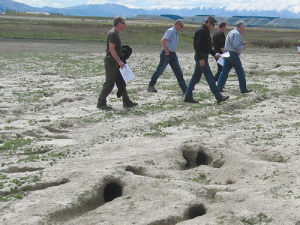Rabbit-plagued farmers are disappointed that bureaucracy has held up the anticipated release of a new strain of rabbit haemorrhagic disease (calicivirus).
Environment Canterbury, acting for a national co-ordinating group, says the release is delayed a year to autumn 2018 because “further work is needed to address the regulations permitting its legal importation”.
The new variant, known as RHDV1 K5, is already being released in Australia, and New Zealand authorities had hoped to release it here about the same time.
Federated Farmers Otago provincial president Phill Hunt says it’s not a new virus, only a new strain, and he’s disappointed the bureaucracy seems to be putting hoops in the way.
“It concerns me that it’s probably being done by people with no skin in the game,” he told Rural News.
“It’s just a part of their job and there’s probably no hurry or urgency, whereas out in the real world we’re under the gun and facing a bit of pressure, economically and environmentally, from rabbits.”
Hunt farms sheep and beef on 470ha between Wanaka and Hawea and now must decide how to proceed.
“We’ve got plenty of rabbits. We were due to do a major [kill] so we’ve got to decide now whether we do that with toxins or wait until next autumn.”
Graham Sullivan, ECan regional leader biosecurity, concedes they knew from the start of the approvals process that time was tight. They had had to do a lot of work to get the required agricultural compounds and veterinary medicine approval: technical information had to be signed off by an independent data assessor, taking longer than expected.
He says that having missed this year’s opportunity it was important to delay the release until the time most effective – autumn -- when no immune newborn rabbits would be around, when carrot bait is most attractive and would last better on the ground, and when UV light, which affects the virus’s efficacy, is less.
ECan is managing the approval process for the NZ Rabbit Coordination Group -- regional and district council staff, Federated Farmers, DOC, MPI and Land Information NZ. Individual regional councils would probably manage the release.
Sullivan sees benefits in the delay, particularly for the South Island east coast councils, in getting monitoring and benchmarking in place prior to the release. And they now also have the luxury of being able to watch the Australian release, to “learn from how they go, and whether they’re successful in starting an epidemic, because that’s a key question we all have”.
Announcing the delay, ECan called for “patience and support from landowners, farmers and other stakeholders”, and warned that an illegal or unmanaged release would compromise its benefits.
The original calicivirus was illegally released in 1997 in the face of official refusals, but Sullivan does not expect any repeat of that. He says farmers are not under the same pressure now, and the ‘no’ decision then was different.
However, NZ scientists are concerned about another strain now in the Australian wild rabbit population, of unknown efficacy and virulence.
“You only get one chance. If someone brings that in, that chance is lost.”



















